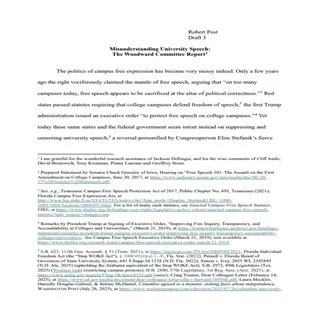By Robert Post
The 1974 Woodward Committee Report at Yale University is regarded as an “authoritative” and “timeless” defense of freedom of speech on university campuses. The Report was commissioned by Yale President Kingman Brewster after student protests prevented Stanford physicist William Shockley from speaking on campus in response to the invitation of a student group. Students objected to Shockley’s racist views. The Report argues that free expression is the “central purpose” of a university, and that therefore speakers’ rights should take precedence over considerations of respect and civility. The Report asserts that the rights of speakers should be “unfettered.” The Report is throughout influenced by the First Amendment opinions of Justice Oliver Wendell Holmes, Jr.
This article argues that the Woodward Report fundamentally confuses freedom of speech and academic freedom. In the American constitutional tradition, freedom of speech is a speaker-oriented right whose purpose is to ensure that “authority . . . is to be controlled by public opinion, not public opinion by authority.” Because the First Amendment stands as the guardian of American democracy, every person enjoys an equal constitutional right to participate in the formation of public opinion. For First Amendment purposes, speech is the medium within which self-government transpires, and so content and viewpoint discrimination is forbidden.
Speech in universities, by contrast, has a very different structure. Speech is not about democracy or self-governance. It is instead the medium within which universities seek to achieve their twin purposes of research and education. These purposes cannot be achieved unless speech is both free and disciplined. This odd combination is embedded in the framework of academic freedom, which both guarantees faculty and students liberty to speak their minds and yet simultaneously subjects that expression to rigorous forms of evaluation and judgment.
In universities, speech that facilitates research and education is protected, but speech that undermines research and education is not. Certain kinds of civility are essential for education, which is why academic freedom prohibits faculty from verbally abusing students. This article denominates this kind of civility adverbial civility, because it concerns the treatment of persons. Other kinds of civility, however, may be inconsistent with education, because it is used as a reason to shut down rational engagement with ideas deemed hateful and obnoxious. This article denominates this kind of civility adjectival civility, because it concerns the character of ideas under discussion.
Academic freedom requires adverbial civility, but it may be inconsistent with adjectival civility. The Woodward Report misses this essential distinction because it focuses on the rights of speakers instead of carefully analyzing the educational mission of universities. If, as seems to be the case, most major universities regard their undergraduate education as oriented to preparing students to become democratic citizens, it is essential for universities to teach students democratic tolerance, which is to say the ability rationally to engage the ideas of peers, even if those ideas are hateful or obnoxious. On this account of the purpose of a university education, adjectival civility cannot be a reason to prevent speech.
A correct analysis of the Shockley incident at Yale does not turn on Shockley’s right to speak, because Shockley had no such right, but instead on Yale’s educational objectives in dealing with its students. By focusing narrowly on First Amendment rights of free speech, the Woodward Report entirely misses this dimension of the problem. It fails to illuminate what lessons Yale should be teaching its students and the implications of those lessons for Yale’s response to the suppression of Shockley’s speech.




